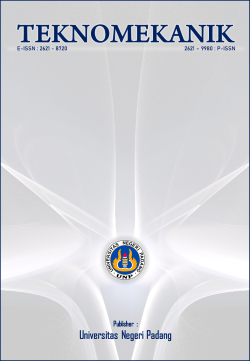Economic analysis of variable speed drive control through profinet technology on distributed control system: A case study in essential oil processing factories
DOI:
https://doi.org/10.24036/jptk.v6i2.32123Keywords:
Variable speed drive, Profinet, Efficiency, System reliability, Cost-benefit analysisAbstract
Electrical equipment in essential oil processing plants is generally dominated by electric motor loads. In today's digital era, global competition and technological advances encourage factories to increase the efficiency and reliability of their production equipment. One way of efficiency is to use a variable speed drive (VSD). The existence of Profinet technology as a network protocol between the control equipment and the VSD allows users to increase system reliability while increasing energy use efficiency. Even so, there are still many factories that are hesitant to use this technology in their automation systems. Many low to medium-sized factories still use traditional control methods such as hardwired. This method is considered more reliable, and inexpensive compared to using Profinet technology. Cost-benefit analysis is carried out to prove this paradigm. At the same time provides certainty that the investment costs incurred in building the system provide added value for production equipment. From this research, it is proven that the use of Profinet technology in addition to providing savings on investment costs also provides benefits from a technical perspective. This technology also allows the implementation of condition-based monitoring systems for electric motors in production equipment. Which in turn can increase the performance and service life of the machine.
Downloads
References
Barnes, M. (2003a). 1 - Introduction. In M. Barnes (Ed.), Practical Variable Speed Drives and Power Electronics (pp. 1–35). Newnes. https://doi.org/10.1016/B978-075065808-9/50001-2
Barnes, M. (2003b). 8 - Installation and commissioning. In M. Barnes (Ed.), Practical Variable Speed Drives and Power Electronics (pp. 209–228). Newnes. https://doi.org/10.1016/B978-075065808-9/50008-5
Cena, G., Durante, L., & Valenzano, A. (1995). Standard field bus networks for industrial applications. Computer Standards & Interfaces, 17(2), 155–167. https://doi.org/10.1016/0920-5489(94)00051-H
Dias, A. L., Turcato, A. C., Sestito, G. S., Brandao, D., & Nicoletti, R. (2021). A cloud-based condition monitoring system for fault detection in rotating machines using PROFINET process data. Computers in Industry, 126. https://doi.org/10.1016/j.compind.2021.103394
Flammini, A., Ferrari, P., Sisinni, E., Marioli, D., & Taroni, A. (2002). Sensor interfaces: from field-bus to Ethernet and Internet. Sensors and Actuators A: Physical, 101(1–2), 194–202. https://doi.org/10.1016/S0924-4247(02)00201-7
Glazer, R. (1993). Measuring the value of information: the information-intensive organization. IBM Systems Journal, 32(1), 99–110. https://doi.org/10.1147/sj.321.0099
Hur, M., Lee, S. kyung, Kim, B., Cho, S., Lee, D., & Lee, D. (2015). A study on the man-hour prediction system for shipbuilding. Journal of Intelligent Manufacturing, 26(6), 1267–1279. https://doi.org/10.1007/s10845-013-0858-3
Huynh, M., Goose, S., & Mohapatra, P. (2010). Resilience technologies in Ethernet. Computer Networks, 54(1), 57–78. https://doi.org/10.1016/J.COMNET.2009.08.012
Ishii, N., Takano, Y., & Muraki, M. (2014). An order acceptance strategy under limited engineering man-hours for cost estimation in Engineering-Procurement-Construction projects. International Journal of Project Management, 32(3), 519–528. https://doi.org/10.1016/j.ijproman.2013.07.009
Kumar, B., Chauhan, Y. K., & Shrivastava, V. (2015). Performance analysis of induction motor drive with optimal rotor flux for energy efficient operation. Proceedings of 2014 IEEE International Conference on Advanced Communication, Control and Computing Technologies, ICACCCT 2014, 319–322. https://doi.org/10.1109/ICACCCT.2014.7019455
Mahalik, N. P., & Yen, M. (2009). Extending fieldbus standards to food processing and packaging industry: A review. Computer Standards and Interfaces, 31(3), 586–598. https://doi.org/10.1016/j.csi.2008.03.027
Persechini, M. A. M., & Jota, F. G. (2013). Centralized and distributed control architectures under Foundation Fieldbus network. ISA Transactions, 52(1), 149–161. https://doi.org/10.1016/j.isatra.2012.09.005
PROFINET System Description Technology and Application. (2014).
Vadi, S., Bayindir, R., Toplar, Y., & Colak, I. (2022). Induction motor control system with a Programmable Logic Controller (PLC) and Profibus communication for industrial plants — An experimental setup. ISA Transactions, 122, 459–471. https://doi.org/10.1016/J.ISATRA.2021.04.019
Downloads
Published
Issue
Section
License
Copyright (c) 2023 Adhipa Tri Setyawan Alim, Budi Sudiarto

This work is licensed under a Creative Commons Attribution 4.0 International License.





